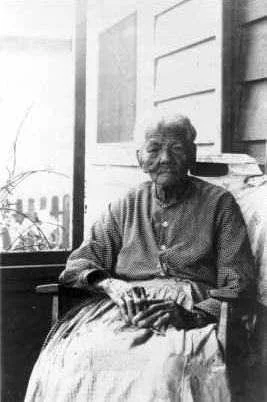Mobile, Alabama
Interviewed by Ila B. Prine and Ira S. Jordan
Federal Writers’ Project, Dist.2.
April 16, 1937.

Aunt Charity Anderson who claims to be one hundred and one years old, (101) was born at Belle’s Landing, Monroe County, Alabama. Her white “Marster” was Mr. Leslie Johnson who kept a public wood yard at Belle’s Landing on the Alabama River.
Aunt Charity now lives on St. Stephens Road, about one mile and a half north of Toulminville, a suburb of Mobile, Ala. She lives with a niece, in a very comfortable and modern four-room house.
Although her sight is impaired, and she is a little hard of hearing, her mind seems to be clear and her memory good. She is not able to leave the house, but with the aid of a stick, she manages to hobble around in the house. She quite often falls and recently had two severe falls, which left her with a scar on her forhead; otherwise she is a very nice old Mulotta darky. Fair of complexion and snow-white hair, which was neatly combed and braided at the back of her head. Having lost all teeth, she cannot eat solid food, but still is a tall, well proportioned woman.
Aunt Charity loves company and is delighted when any one comes to visit her, as she spends the day alone while her niece is away working. When asked if she did not get tired of staying alone in the house? She replied: “I has so much tr’uble gittin’ up and down de steps, and tr’uble gittin’ ober de groun’, I Jes makes myse’f happy her, cause thank de Lord I’se on Zion’s March”.
Aunt Charity with gingham dress, which had yards of material in the skirt, and her black and white checked apron, white head rag, be-spectaled eyes, sitting in a rocking chair before a fire, sorting and folding clean rags, carried one back to the days of long ago, when she told of her happy life before the Civil War.
She said “Missy, peoples don’t live now, and niggers ain’t got no manners, and don’t know nothin’ about waitin’ on white folks. I kin remember de days when I was one of de house servants. Dere was six of us in de ol’ marster’s house, me, Sarai, Lou, Hester, Jerry and Joe. Us didn’t know nothin’ but good times den. My job was lookin’ a’ter de corner table whar nothin’ but de desserts sat. Jo and Jerry were de table boys, and dey ne’ber touched nothin’ wid dere hans’, dey used de waiter to pass things wid. My! dem was good ol’ days.
“My old Marster was a good man, he treated all his slaves kind, and took care of dem, he wanted to leave dem hisn chillun. It sho’ was hard for us older uns to keep de little cullered chillun out ob de dinin’ room whar ol marster ate, cause when dey would slip in and stan’ by his cheer, when he finished eatin’ he would fix a plate and gib dem and dey would set on de hearth and eat. But honey chile, all white folks warn ‘t good to dere slaves, cause I’se seen pore niggers almos’ tore up by dogs, and whipped unmercifully, when dey did’nt do lack de white folks say . But thank God I had good white folks, dey sho’ did trus’ me to, I had charge of all de keys in the house and I waited on de Missy and de chillun. I laid out all dey clos’ on “But listen, honey, I sho’ could wash, iron, knit and weave, bless yuh, I could finish my days’ work aroun’ de house, and den weave six or seven yards o’cloth. I’se washed, ironed and waited on de fourth generation ob dis family. I l’arned de chillun how to wash, iron, weave, and knit. I jes wish I could tell dese young chillun how to do, if dey would only suffer me to talk to dem, I’d tell dem to be more ‘spectful to dere mammas, and to dere white folks and say ‘yes mam’ an ‘no mam’, instid of ‘yes’ and ‘no’ lack dey do now.
“I ain’t neber been in no tr’uble in mah life, I ain’t been in no lawsuits, I ain’t neber been no witness. I neber had seen a show in my life ’til jes dis pas’ year, when a show, wid swings, lights, and all de doings dey have stop’ in front ob our house har.
“I’se allus tried to treat eberybody as good as I kin, and I uses my manners as good as I knows how, and de Lord sho’ has taken keer ob me. Why, when my house burnt up, de white folks helped me so dat in no time you could’nt tell I had ebber los’ a thing.
But honey, de good ol’ days is don’ gone forebber. Bless you when we lib at Johnson’s Landing on de river, folks would come dere to catch de steamboats, and we neber knowed how many to put on breakfas, dinner, or supper fo’ cause sometimes de boats would be a little behin’ times and sometimes a little before times and we allus had a house full. And as for paying my fare on de boats, I neber had dat to do, when ole Captain John Quill wars livin’ he allus lowed me to ride his boat fo’ nothin anywhar I wanted to go. But what’s the use thinking about dem times, dey’s gone, and de world is ‘gettin’ wicked’er, sin is bolder and bolder, and religion grows colder and colder”.
